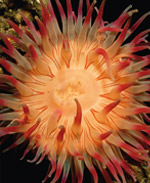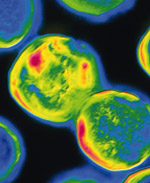- Medical knowledge from the sea
- > Marine organisms such as bacteria, corals and sea sponges contain thousands of interesting substances that could provide us with the medications of the future. Some of these agents have already been approved as drugs. Research on primordial organisms can reveal both how diseases occur and how they can be treated. Before the treasure trove beneath the sea can be claimed, however, some legal issues must be resolved.

The dawn of a new era?
The extraction of marine substances for medical or industrial use is attracting greater interest from both scientists and the business sector. In recent years a range of substances has been derived from marine organisms which are now used in cancer therapy and the treatment of viral infections. Modern methods of genetic analysis greatly simplify the search for substances – because they by-pass the need for laborious cultivation in laboratories. Businesses long hesitated to become involved in the expensive search for marine substances, and this remained the province of academic institutions. But as young start-up businesses become established, the commercialization of marine-derived drugs is gaining momentum. However, the lack of venture capital providers often leaves a substantial innovation gap between pure research and the pre-commercial development of a substance. Government funding could be crucial in helping to bridge the gap, especially during the long phase of clinical testing. But it is not only the prospect of new substances which is making the exploration of marine organisms so interesting. It seems that the meta- bolic pathways of primitive marine organisms and humans are in many ways remarkably similar. Simple life forms such as sponges and cnidarians provide ideal models for understanding human biochemical processes and diseases. Research is focusing on disorders of the human barrier organs – the skin, lungs and the intestine. Experts believe that these are triggered when the human immune system and the symbiotic bacteria colonizing the bodys surface are not interacting as they should. Here too cnidarians, as relatively simple host-bacteria systems, can provide new insights. We are certain that bacteria in the barrier organs play a major role in the critical balance between health and disease. But what exactly happens between humans and microbes is still virtually unknown territory, requiring years of research. Given the new interest in the topic, clarification is also needed on how the biological resources of the oceans should be shared between nations.


